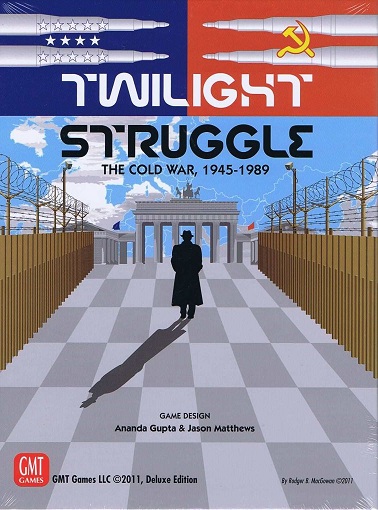
"Now the trumpet summons us again -- not as a call to bear arms, though arms we need, not as a call to battle, though embattled we are -- but a call to bear the burden of a long twilight struggle..." --John F. Kennedy, Inaugural Speech, January 1961
What's all this, then?
Twilight Struggle is a two-player board game designed by Ananda Gupta and Jason Matthews, and published by GMT games in 2005. As the box proudly proclaims, the game chronicles the fascinating conflict between the United States and the Union of Soviet Socialist Republics between 1945 and 1989 that would later become known as the Cold War. Each player takes on the role of one of these global superpowers as they seek to spread their influence throughout the world and counter their opponent's, through both friendly diplomacy with other countries and... less savory means.
Oh god, is this one of those games with a million different counters and thirty little things to worry about and--
Nope! Twilight Struggle is one of those board games that looks really complicated at first, but turns out to be relatively simple. There is a grand total of one type of counter that the players place on the board, and six different "status" tracks to pay attention to (two of which are simply the current turn and round). I'd say it's possible to learn all of the rules of the game in less than a half-hour.
Fine. So why would I want to play this?
Twilight Struggle has held the #1 all-time rank on BoardGameGeek for several years now, and with good reason. Not only is it an extremely well-balanced and approachable game, but it is probably the supreme example of a board game that successfully weds its gameplay design with its theme. Quite simply, playing Twilight Struggle feels like the Cold War. The game mechanics are designed to fill both the US and USSR with a constant paranoia that the world is one move away from falling to the opponent's ideology, and a need to respond to every single move their opponent makes, even if it turns out to be a bluff. Add to that the specter of global nuclear war, which both superpowers must constantly threaten but never actually allow, and you end up with a game that is intense and exhilirating to play.
Wait, you said two-player? So we're just going to watch two random people duke it out with no input?
Not quite. While there will indeed be two people playing the US President and the USSR's General Secretary, others are able to join in on the fun as members of Congress and the Politburo in order to advise their leaders on the best course of action and hopefully spice up the thread. Twilight Struggle's gameplay is based heavily around a hand of cards that each side holds, so there will be some secrecy required for each team, but the scope of possible actions is limited enough that I'm hoping it will be possible to do some general strategizing in-thread.
Okay, I'm in. How do I play this game? And how do I sign up?
Glad you asked! I'll be doing my best to summarize the rules below, but I urge all participants (and will require the two leaders) to read the official game rules on GMT's website. Sign-up details are in the post below!

 Link to official rulebook
Link to official rulebook 
 Link to official rulebook errata
Link to official rulebook errata  (if you have a question about a specific card it's likely answered here)
(if you have a question about a specific card it's likely answered here)
The Board
The board of Twilight Struggle is divided into several Regions, each with their own scoring value. These Regions are in turn divided into several Countries, each with space for the Influence markers of the two superpowers. Each Country also has a number in the top right, known as its
Stability
Certain countries have purple title bars, which indicate that they are Battleground Countries. Battleground Countries are mostly identical to regular Countries, but are much more important for scoring purposes. Controlling them is key to winning the game.
Victory Points

The object of Twilight Struggle is to score victory points through playing cards and scoring Regions. Instead of keeping track of each superpower's individual score, Twilight Struggle only records the difference between the two. If either superpower attains a lead of 20 VPs, they immediately win the game. Otherwise, if the game runs through all of its turns, the winner is the superpower whose side the VP marker is on.
Influence

Influence is the main "resource" of the two superpowers in Twilight Struggle. Influence markers can be placed or removed by playing cards, and can be used to take control of countries. A superpower has control of a country if the difference between their Influence and their opponent's is equal to or greater than that country's Stability. If a superpower controls a country, the colored side of their Influence marker is turned face up; otherwise the white side is used.
Game Flow

A game of Twilight Struggle is made up of ten Turns, but this name is a bit misleading since players will alternate playing cards multiple times over the course of a single Turn. A better way to put it is that a game of Twilight Struggle is made up of ten "hands". At the start of a Turn, each superpower receives a hand of cards that they will make use of to perform various actions. The ten Turns of the game are also divided into three chronological periods: Early War, Mid War, and Late War. The current period determines which cards are available in the deck, as well as the number of cards each side receives and can play per Turn.
Cards

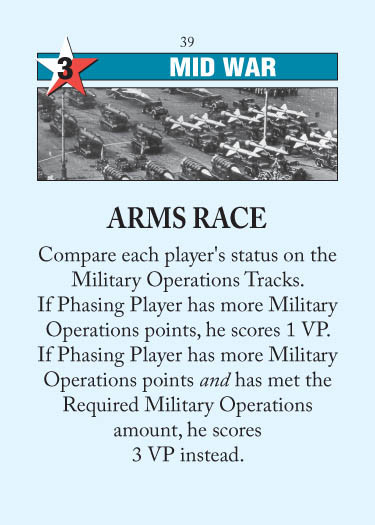
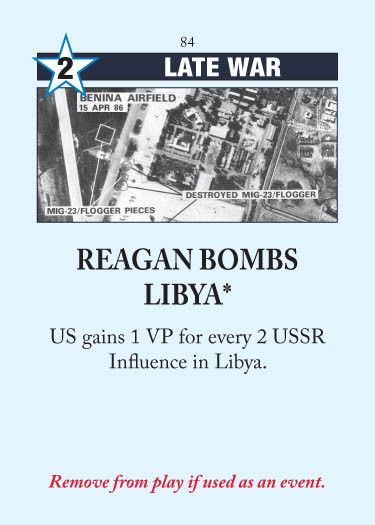
Twilight Struggle makes use of a deck of cards, nearly all of which are based on an actual historical event or concept from the Cold War. All actions in Twilight Struggle require a player to play a card from their hand. Every card has four important aspects: a time period (along the top), an Event (the title and text), an Event affiliation (the color of the star in the top-left), and an Operations Value (the number in the star). Events can be affiliated with the US (white star) or the USSR (red star), or be neutral (half-red, half-white star).
A card's time period determines when it will be available in the deck. At the start of the game, the deck is made up of only Early War cards. Mid War cards are shuffled into the deck at the beginning of Turn 4, and Late War cards are shuffled into the deck at the beginning of Turn 8.
Playing Cards

At the beginning of a Turn, both players draw cards until they reach the current time period's hand limit, which is eight cards in the Early War and nine cards in the Mid and Late War. After each player has drawn their hand, a Turn is divided into two phases in which the players play cards: the Headline Phase and the Action Rounds.
During the Headline Phase, both sides simultaneously choose and play a card from their hand for the Event. Both Events are immediately resolved, with the card with the higher Operations Value going first. The US wins ties.
After the Headline Phase, play proceeds to the Action Rounds. Starting with the USSR, players alternate playing and resolving cards one at a time. During the Action Rounds, a card can be played in three ways:
- It can be played as an Event, in which case the text of the card is resolved,
- it can be played on the Space Race (described below), in which case the Event is ignored, or
- its Operations Value can be used to Conduct Operations. If the Event on the card is neutral or affiliated with the superpower playing it, it is ignored, but if it is affiliated with the opponent, the Event still occurs! The superpower playing the card chooses whether the Event occurs before or after its Operations.
There are six Action Rounds per Turn for each superpower in the Early War, and seven in the Mid and Late War. Most Turns will end with a card or two still in each superpower's hand, which they keep for the next Turn.
Operations

If a superpower plays a card to Conduct Operations, it has three Operations to choose from:
- It can Place Influence to consolidate or expand their Influence in one or more areas,
- it can attempt to Realign governments to reduce enemy Influence, or
- it can back a Coup in a country, which can very quickly shift its government from one superpower's control to the other, but risks dragging the world towards nuclear war.
A superpower can choose any of these when conducting Operations, but it must use all of the Operations Value of the card on a single Operation type.
If a superpower chooses to Place Influence, they may place Influence markers on the board in countries that contain or are adjacent to countries already containing some of their Influence at the time the card was played. It costs 1 Operations point to place 1 Influence in a country that is not controlled by the opponent, and 2 Operations points to place 1 Influence in a country that is. If a country "flips" out of the opponent's control while placing Influence, the superpower can continue placing Influence there at the lower rate.
If a superpower chooses to attempt Realignment, it may attempt one realignment anywhere in the world for each Operations point on the card, and may attempt to Realign the same target more than once. To attempt a Realignment, the superpower chooses a country to target, and then both players roll a die. Each player adds to their roll:
- +1 for each country they control adjacent to the target,
- +1 if their superpower is adjacent to the target, and
- +1 if they have more Influence in the target than their opponent.
If one superpower has a higher modified roll than the other, then the loser must remove Influence from the target country equal to the difference, if able, or all of it if they cannot. It is impossible for either superpower to gain Influence during a Realignment attempt.
If a superpower chooses to attempt a Coup, it may attempt one coup anywhere in the world, regardless of the Operations value on the card. To attempt a Coup, the superpower chooses a country to target and then rolls a die. The superpower adds the Operations value of the card to this roll, and then compares the sum to two times the target's Stability. If the sum is higher, then the Coup is successful, and the superpower removes the opponent's Influence from the target country equal to the difference. If the difference is higher than the opponent's Influence, any extra points are added to the Influence of the superpower that backed the Coup. Nothing happens if the Coup fails.
Regardless of whether or not the Coup is successful, a Coup attempt in a Battleground country lowers the DEFCON status (see below) by one. All Coups also add the Operations value of the card used to the Military Operations track.
The Space Race

Once per Turn, each superpower can choose to play a card on the Space Race. By playing a card with an Operations Value equal to or greater than the value listed below the next box, a superpower may roll a die and move their Space Race marker forward if they succeed in their roll. Advancing in the Space Race grants VPs and additional abilities to the superpower in the lead.
While the VPs and abilities of the Space Race are nice, the real use of the track is to allow the superpowers to discard Events that they really, really don't want to see happen, since any card played on the Space Race has its Event ignored. Remember, though, that cards discarded this way might be shuffled back into the deck later!
Scoring
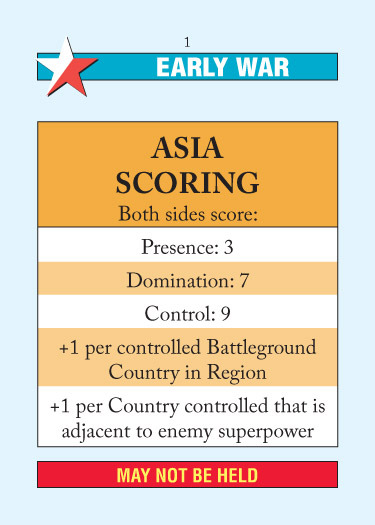
The main way the superpowers earn VPs is through the several scoring cards scattered throughout the deck, one for each Region on the board. When one is played, both superpowers receive VPs based on their Influence in that Region. There are three states that a Region can be in for each superpower, and each Region has a VP value for each state:
- A superpower has a Presence in a Region if it controls at least one country there.
- A superpower has Domination of a Region if it controls more Battleground countries and more countries overall there than their opponent, and controls at least one non-Battleground country.
- A superpower has Control of a Region if it controls every Battleground country and more countries overall there than their opponent.
A great deal of strategy in Twilight Struggle revolves around using scoring cards appropriately and successfully predicting when your opponent is holding them. Scoring cards must be played during the Turn they were drawn, and the biggest fights over Regions usually occur when a scoring card is in a superpower's hand.
In addition to scoring cards, a Final Scoring occurs at the end of Turn 10. At this time, all regions are scored simultaneously, as though their scoring cards had all been played.
DEFCON
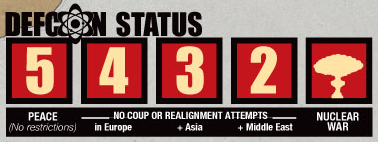
Although each superpower must fight fiercely against its opponent for control of the world, they also must ensure that the Cold War remains just that: cold. The DEFCON track measures tension in the world and the likelihood of the Cold War turning into a real one, on a scale from 5 (peace) to 1 (global nuclear war). Several things in the game will cause DEFCON to "improve" (i.e., increase) or "degrade" (decrease):
- DEFCON automatically improves by one level at the beginning of every Turn.
- A Coup attempt in a Battleground country, regardless of its success, degrades DEFCON by one level.
- Various Events can change DEFCON according to the text on the card.
The DEFCON track has a couple of effects. First, as DEFCON decreases, Coups and Realignments become forbidden in certain Regions, as printed on the track. More importantly, however, if DEFCON ever reaches 1, nuclear war has broken out between the two superpowers and the game is over. The superpower that played the card that caused the DEFCON drop immediately loses, even if the card contained a choice made by their opponent. Cards that allow the person not playing them to degrade DEFCON are thus sometimes known as "DEFCON suicide" cards, since your opponent would have to be an idiot not to degrade DEFCON if you play one at DEFCON 2.
The DEFCON track is a bit of a paradox for both superpowers, since both high and low levels offer advantages and disadvantages. A high DEFCON means you can make Coup or Realignment attempts pretty much anywhere, but the same goes for your opponent. A low DEFCON (specifically DEFCON 2) means Coups in Battlegrounds aren't allowed at all and you could potentially instantly lose if you play a bad card, but it also means your opponent will have much fewer options for breaking control of your countries. In practice, though, games of Twilight Struggle will usually spend most of their time at DEFCON 2. There simply aren't that many ways to improve DEFCON, and if it does improve, both superpowers will immediately leap at the chance to perform a Coup in a Battleground country while it is still available, if for no other reason than to deny it to their opponent.
The China Card
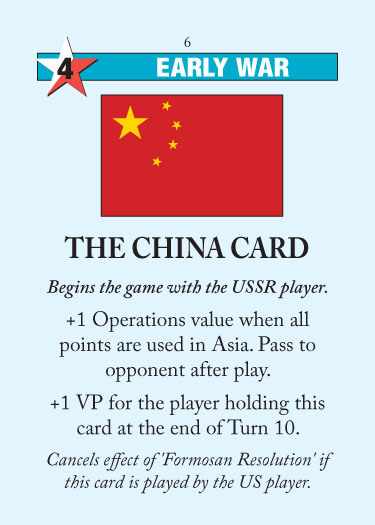
Although China was a major player in the Cold War, it does not have a space on the board. Instead, China's role in the Cold War is abstracted through The China Card, a special card that begins the game with the USSR. Unlike other cards, The China Card is placed face up in front of the superpower who holds it, and is not considered to be part of their hand. During the Action Rounds, a superpower that owns The China Card may choose to play it instead of a card in their hand, but using it requires the player to give the card to their opponent face down. The China Card remains face down until the Turn ends, at which point it turns face up and becomes available for use by its new owner.
Required Military Operations

Lastly, there is a track on the board that records the Military Operations undertaken by each superpower in a Turn, in order to encourage the players to not be too passive. Backing Coups and certain Events will add Operations to this track. At the end of each Turn, if a superpower conducted fewer Military Operations than the current DEFCON status, they will lose the difference in VPs. For example, if the US conducted 1 Military Operation in a Turn, and the Turn ended while DEFCON was at 3, the US would lose 2 VPs.
Edited by Urbandale ()
- NO SPYING. I really wish I didn't have to do this, because obviously espionage was kind of a major deal in the Cold War, and it would honestly be really awesome and thematic if I could somehow allow players to participate as spies. But the fact is that a great deal of the gameplay and "feel" of Twilight Struggle comes from not knowing what cards your opponent is holding. Obviously this will have to be on the honor system, but if you take on a role that gives you access to a superpower's hand, please do not give out access to other players. If you really want to learn the contents of your opponent's hand, there are a few cards already in the game to do that for you.
- Do not, under any circumstances, post any of the contents of your superpower's hand in the thread.
- Speculation in the thread about your opponent's hand (or either side's hand if you don't have access to either) is permissible and even encouraged. Trying to work out what your opponent is holding is a major part of the game, and I will make information about what cards have been played and what cards could still be in the deck public knowledge.
Right, that should cover most things. Now then...
 HOW TO SIGN UP
HOW TO SIGN UP 
I will be looking for people to take on one of the following roles:
- One US President and one USSR General Secretary, to make the final decisions on what cards to play and what actions to take.
- Two Vice Presidents and two Deputy General Secretaries, to take on the role of President or General Secretary if the person playing them is unavailable or fails to meet a deadline.
- Members of Congress and the Politburo, who will have access to their side's hand and strategy discussion but no decision-making power.
Positions for leaders and vice-leaders will be on a first-come, first-serve basis. Congress and the Politburo will have unlimited space, but if one side becomes much larger than the other, I may close off sign-ups for the larger side until the teams balance out. If you are new to the game, don't worry about taking a leadership role. The reason there are multiple people on your side is to help you out and act as a brain trust for you to meet your goals.
 If you wish to be a leader, vice-leader, or a Congress/Politburo member, then please do the following two things:
If you wish to be a leader, vice-leader, or a Congress/Politburo member, then please do the following two things: 
- Post in the thread declaring the position you would like to take, and
- Email me at UrbandaleLF@gmail.com and tell me your forum name in the message so I can grant you access to the google docs for your side.
Each side will have two private google docs: a document containing their hand, which will be non-editable, and a document for discussing strategy privately with other team members. I plan to record the strategy discussions for both sides and later post them in the thread so we can discuss why certain things happened the way they did. And probably also laugh at people screaming when things don't go their side's way.
Each side is also free to set up other means of communicating among themselves, such as IRC, but I would appreciate it if you could keep most of the discussion in your side's strategy document.
Leader Rules
The President and General Secretary will be ultimately responsible for all decisions made for their team, but if you are playing one of these roles and know you are going to be unavailable (say, because you're out of town), you may post in the thread to temporarily promote one of your vice-leaders to the top spot. Once you are available, you may post in the thread again to regain your role. Likewise, if something unexpected comes up while I'm waiting on you and you find yourself having to care more about real-life shit than a board game on the internet, feel free to request a deadline extension in the thread. Please try not to abuse this though.
If the President or General Secretary misses a deadline for submitting an action or decision without informing me in advance, then I will post in the thread saying so, and promote one of the vice-leaders to the top role myself. The new leader will then receive a new deadline for the decision. If a leader does this once, they may post in the thread to request their old role back, and I will grant it to them. If they do it twice, however, then that leader is out and the vice-leader will permanently take on the top role from then on. A leader who loses his or her spot will become a member of Congress or the Politburo.
Deadlines
Every card play and action will have a deadline by which a leader will have to submit their decision. Deadlines will always be at 7PM PST (-8 GMT), though you are of course permitted to send in your decision before then. For Headline Phases and the start-of-game Influence placing, there will be a 48-hour deadline to submit decisions, to allow each side time to review their new hand and come up with a general strategy for the Turn. Action Rounds and all other decisions (including decisions needed due to Events during the Headline Phase) will have 24-hour deadlines.
Edited by Urbandale ()
Edited by Urbandale ()
Official Rulebook
Card List
Errata
Player List
United States
President: Leocrusher
Vice Presidents: radical_frailty
Congress: Sub Rosa
Union of Soviet Socialist Republics
General Secretary: Robocommie
Deputy General Secretaries: TitoToGoToTogo; izzyp
Politburo: yam the king of crops; drunkbaby
Game Status
Current Phase: Turn 1, US Action Round 5
Victory Points: US 2
DEFCON Level: 2
US cards in hand: 3 + The China Card (face down)
USSR cards in hand: 1
Cards remaining in draw deck: 22
Cards in discard pile: Five Year Plan, The Cambridge Five, Red Scare/Purge, Nuclear Test Ban, US/Japan Mutual Defense Pact, NORAD, UN Intervention, Arab-Israeli War, Duck and Cover
Cards out of play: De-Stalinization, Fidel, Truman Doctrine
Ongoing Effects
None
US Action Round has 24 hours to be chosen, due 7PM PST (-8 GMT) on Friday, November 7th.
Previous Updates
USSR Influence Placement
US Influence Placement
Turn 1 Headline Phase
USSR AR 1
US AR 1
USSR AR 2
US AR 2
USSR AR 3
US AR 3
USSR AR 4
US AR 4
USSR AR 5
US AR 5
USSR AR 6
US AR 6
The USSR started their push subtly, with a goodwill tour throughout those countries newly-liberated from Nazi rule. General Secretary Robocommie spoke often of repairing the damage left behind by the Nazi war machine while also stressing the need to build a better life for all together, finding willing and war-weary ears everywhere he went. This sympathy and soft speaking won over the hearts of many in what would soon come to be called the Eastern Bloc.

USSR gains 1 Influence in East Germany
USSR gains 1 Influence in Poland
USSR gains 1 Influence in Czechoslovakia
USSR gains 1 Influence in Hungary
USSR gains 1 Influence in Romania
USSR gains 1 Influence in Yugoslavia
USSR gains 1 Influence in Bulgaria
Game Status

The US now has the opportunity to place 7 Influence anywhere in Western Europe. Leo_crusher, please email me the location(s) for your side's Influence. This decision is due by 7PM PST on Friday, October 24th.
To the west, France lay in shambles. The US knew that the only existing French administration was the collaborator government in Vichy, but having them take power over the newly-unified France would be unacceptable for the French resistance fighters and could lead them right into the arms of the Communists. The Gaullists were the only remaining acceptable choice for America, but de Gaulle himself refused to step out of retirement. In response, the US supported the continuation of the Third Republic government, hoping that the French would figure out what kind of government they wanted while plying them with economic aid.

US gains 4 Influence in West Germany and gains control!
US gains 3 Influence in France and gains control!
Game Status
Current Phase: Turn 1 Headline Phase
Victory Points: 0
DEFCON Level: 5
US cards in hand: 8
USSR cards in hand: 8 + The China Card (face up)
Cards remaining in draw deck: 22
Cards in discard pile: None
Cards out of play: None
Ongoing Effects
None

Alright both sides now have another 48 hrs to email me their headline and how they want the headline event to be resolved (if that applies). Headline due Saturday October 25 7PM PST (-8 GMT).
While the theory proved to be correct, neither were factoring in the eventual invasion of Nazi Germany. As it grew more and more beligerent prior to the invasion, factories were converted and built to produce massive quantities of war materials that eventually allowed the USSR to nearly-singlehandedly defeat the strongest military in the world at that time.
After the revolution however, the military and the state aparatus learned an important lesson - without continued cooperation between the two, the USSR would fall. After the partition of Germany and in response to US beligerence, plans to invest in numerous areas had to be canceled to gear up for what seemed to be war once again.

US Plays Five Year Plan!
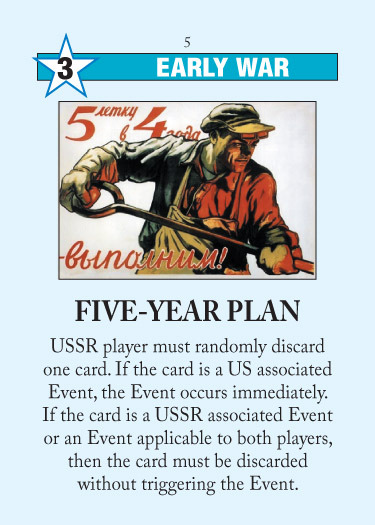
USSR Discards Red Scare/Purge!

-----
During WW2 the USSR saw the effectiveness of British signals intelligence, primarily concerned with codebreaking and determining the enemies movements and long-term battleplans. As the US stepped up its presence in Europe they knew that while they build up their own intelligence aparatus, they needed intelligence about what the US was pplanning this week, today or even this very hour, time schedules that Soviet intelligence had neither the manpower nor resources to procure. Instead, they went to the source.
Placing several agents in lower ranking positions inside British intelligence to slowly convert officers led to huge amounts of information being gathered. Unfortunately someone stumbled in on the secret, outing one of the agents who talked under torture and told MI5 everything they wanted to know about what the Soviets had been doing the past few years.

USSR Plays The Cambridge Five!
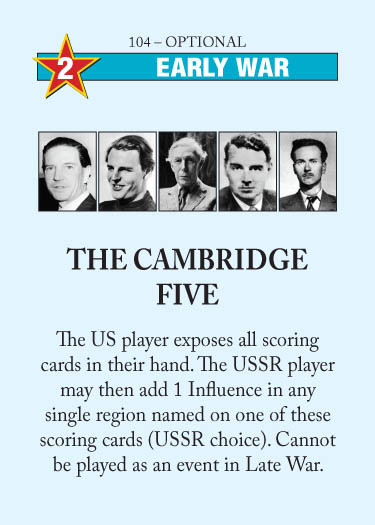
No Scoring cards in US hand, No Effect!
Games Status
Current Phase: Turn 1, USSR Action Round 1
Victory Points: 0
DEFCON Level: 5
US cards in hand: 7
USSR cards in hand: 6 + The China Card (face up)
Cards remaining in draw deck: 22
Cards in discard pile: Five Year Plan, The Cambridge Five, Red Scare/Purge
Cards out of play: None
Ongoing Effects
None

It is now the USSR's Action Round. Please email me the USSR's card for the round, as well as how you would like the card to be played and (if the card contains a US Event) if you would like the Event to occur before or after your action.
USSR Action Round has 24 hours to be chosen but due to a trip to visit family will be due Sunday October 26 7PM PST (-8 GMT)
What did concern the Shah was that those closest to him were also turning away from his leadership, and worse, they were doing so with smiles on their faces. His advisors assured him that everything was under control, despite the demonstrations multiplying every day. The director of his secret police told him of victory after victory against the communist sympathizers, and yet they never seemed to decrease in number. Pahlavi saw what was happening--did they think him a fool?--but he could not understand it. These were men he had known and trusted for years. Some of them had even grown up with him as children. He had given them prestige and riches that most Iranians could only dream of. Were the Soviets’ pockets so deep that they could sway his closest friends to their side? Pahlavi did not know, but he did know that he felt old, tired, and very alone.
So when the Shah heard the tramping of boots outside his office, he was not surprised. When the director of his secret police burst into the room, surrounded by men with rifles, and declared him under arrest for crimes against the state, he felt only resignation. The director told him that he would not be harmed if he did not resist, but Pahlavi knew he was lying. The man he had been before all this madness would have fought back, would have grabbed the pistol hidden in his desk and maybe shot one or two of the men before being killed himself. But Pahlavi was not that man anymore, and he felt tired. There was nothing to fight for. He rose from his desk and submitted to the men without a word.
In the Kremlin, the news that the Shah of Iran had abdicated his throne in favor of a new Communist government was greeted with cheers. In the upper eschalons of government it was hailed as the first post-war victory for the USSR, a success beyond their expectations. The following days were filled with angry phone calls from the US President, accusing the General Secretary of destabilizing the world with the arbitrary imposition of their will on other countries, but everyone in the Politburo knew that the Americans were simply ashamed that they had been caught on the back foot. The underbelly of the USSR was safe, and US influence in the Middle East was waning.

The USSR plays The China Card for Operations!

The USSR attempts a Coup in Iran and rolls a 4!
The US loses 1 Influence in Iran!
The USSR gains 3 Influence in Iran and gains control!
DEFCON degrades to level 4!
The USSR gains 4 Military Operations!
The China Card now passes to the US facedown and unplayable until next Turn.
Game Status
Current Phase: Turn 1, US Action Round 1
Victory Points: 0
DEFCON Level: 4
US cards in hand: 7 + The China Card (face down)
USSR cards in hand: 6
Cards remaining in draw deck: 22
Cards in discard pile: Five Year Plan, The Cambridge Five, Red Scare/Purge
Cards out of play: None
Ongoing Effects
None

It is now the US's Action Round. Please email me the US's card for the round, as well as how you would like the card to be played and (if the card contains a USSR Event) if you would like the Event to occur before or after your action. This decision is due 7PM PST (-8 GMT) on Monday, October 27th.

US Plays Nuclear Test Ban for Operations!
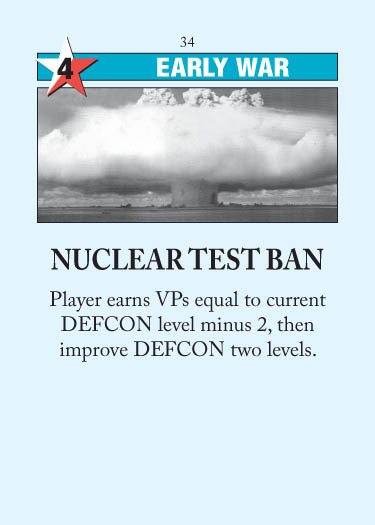
The US gains 1 Influence in Lebanon and gains Control!
The US gains 3 Influence in Israel and gains Control!
Game Status
Current Phase: Turn 1, USSR Action Round 2
Victory Points: 0
DEFCON Level: 4
US cards in hand: 6+ The China Card (face down)
USSR cards in hand: 6
Cards remaining in draw deck: 22
Cards in discard pile: Five Year Plan, The Cambridge Five, Red Scare/Purge, Nuclear Test Ban
Cards out of play: None
Ongoing Effects
None

It is now the USSR's Action Round. Please email me the USSR's card for the round, as well as how you would like the card to be played and (if the card contains a US Event) if you would like the Event to occur before or after your action. This decision is due by 7PM PST (-8 GMT) on Wednesday, October 29th.
After World War Two the joint American/British occupation of Italy rubbed many the wrong way. The Italians were the ones that strung up Mussolini, after all, and with nationalist sentiment still running strong, the occupation was a sore spot for years. Comrade Gramsci was arrested in a government sweep of Communist leaders later known as part of Operation Gladio, and the people were furious. Comrade Bordiga called for a general strike, and strike they did. Government forces gunned down many of these strikers, who were armed mainly with scavenged weapons from the war, until a curious thing happened. Suddenly the Communists were showing up at picket lines in their work uniform and with freshly minted Baretta rifles on their backs. The extra firepower proved decisive over the next few months, as Italians fought their way to parliament and arrested ministers en masse. Comrade Gramsci, newly-freed by a daring raid to free various political prisoners, hailed the development and promptly led a push to clean up various right-wing militias that rose in response. British and American personnel were withdrawn immediately but remain in France.

USSR Plays De-Stalinization for Event!
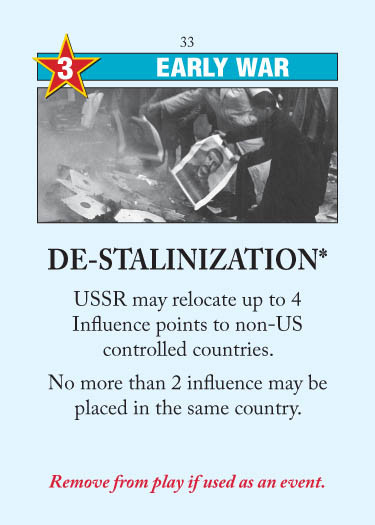
The USSR removes 1 Influence from Czechoslovakia!
The USSR removes 1 Influence from Romania!
The USSR removes 1 Influence from Yugoslavia!
The USSR removes 1 Influence from Bulgaria!
The USSR places 2 Influence in Poland for Control!
The USSR places 2 Influence in Italy for Control!
Game Status
Current Phase: Turn 1, US Action Round 2
Victory Points: 0
DEFCON Level: 4
US cards in hand: 6+ The China Card (face down)
USSR cards in hand: 5
Cards remaining in draw deck: 22
Cards in discard pile: Five Year Plan, The Cambridge Five, Red Scare/Purge, Nuclear Test Ban
Cards out of play: De-Stalinization
Ongoing Effects
None

It is now the US's Action Round. Please email me the card for the round, as well as how you would like the card to be played and (if the card contains a USSR Event) if you would like the Event to occur before or after your action. This decision is due by 7PM PST (-8 GMT) on Thursday, October 30th.

US plays US/Japan Mutual Defense Pact for Ops!
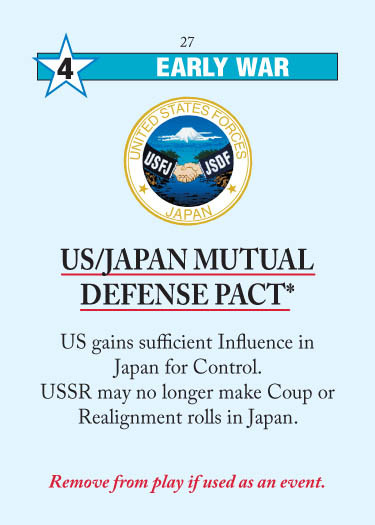
US places 4 Influence in Austria for Control!
Game Status
Current Phase: Turn 1, USSR Action Round 3
Victory Points: 0
DEFCON Level: 4
US cards in hand: 5+ The China Card (face down)
USSR cards in hand: 5
Cards remaining in draw deck: 22
Cards in discard pile: Five Year Plan, The Cambridge Five, Red Scare/Purge, Nuclear Test Ban, US/Japan Mutual Defense Pact
Cards out of play: De-Stalinization
Ongoing Effects
None

It is now the USSR's Action Round. Please email me the card for the round, as well as how you would like the card to be played and (if the card contains a USSR Event) if you would like the Event to occur before or after your action. This decision is due by 7PM PST (-8 GMT) on Saturday, November 1st.
Having been humiliated in the war against Israel several years earlier, Syria was seething. It was seeking aid as well, though for a different reason. Not yet particularly concerned about continued Israeli aggression, many Palestinains ended up settling in Syria as it was one of the few countries that provided unwavering support for their national liberation struggle. The refugees provided an excelent pretense for the Syrian government and military to look to enemies of Israel, and now by extension the US, they naturally looked to the USSR to provide them with weapons. With military aid secured, Syria bided its time for an opportunity to strike back against the Israeli settler state.

USSR plays NORAD for Ops!
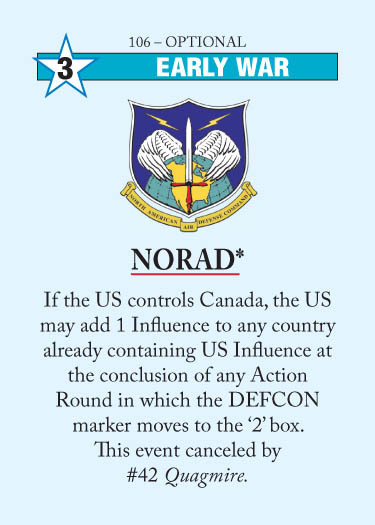
USSR places 2 Influence in Hungary for Control!
USSR places 1 Influence in Syria for Control!
USSR plays UN Intervention for Event!
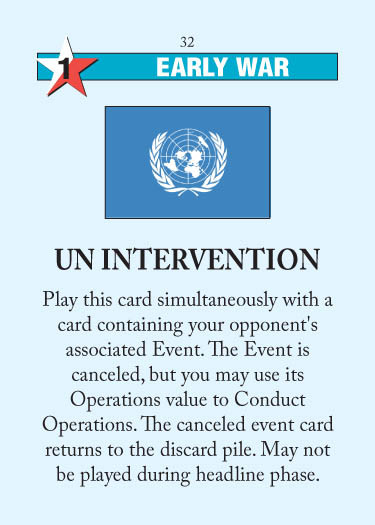
NORAD event Canceled!
Game Status
Current Phase: Turn 1, US Action Round 3
Victory Points: 0
DEFCON Level: 4
US cards in hand: 5+ The China Card (face down)
USSR cards in hand: 3
Cards remaining in draw deck: 22
Cards in discard pile: Five Year Plan, The Cambridge Five, Red Scare/Purge, Nuclear Test Ban, US/Japan Mutual Defense Pact, NORAD, UN Intervention
Cards out of play: De-Stalinization
Ongoing Effects
None

It is now the US's Action Round. Please email me the card for the round, as well as how you would like the card to be played and (if the card contains an opponent's Event) if you would like the Event to occur before or after your action. This decision is due by 7PM PST (-8 GMT) on Monday, November 3rd.

US plays Arab-Israeli War for Ops!
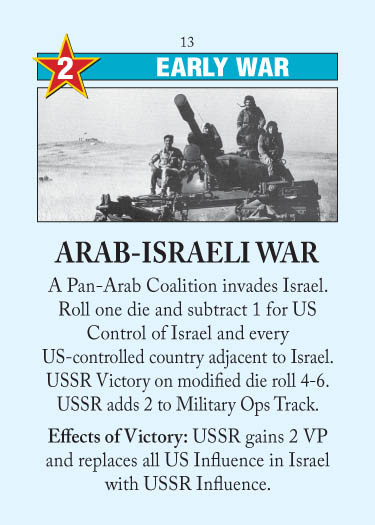
US places 2 Influence in Jordan for Control!
USSR autofails roll due to modifiers!
USSR adds 2 to Military Ops Track!
Game Status
Current Phase: Turn 1, USSR Action Round 4
Victory Points: 0
DEFCON Level: 4
US cards in hand: 4 + The China Card (face down)
USSR cards in hand: 3
Cards remaining in draw deck: 22
Cards in discard pile: Five Year Plan, The Cambridge Five, Red Scare/Purge, Nuclear Test Ban, US/Japan Mutual Defense Pact, NORAD, UN Intervention, Arab-Israeli War
Cards out of play: De-Stalinization
Ongoing Effects
None

It is now the USSR's Action Round. Please email me the card for the round, as well as how you would like the card to be played and (if the card contains an opponent's Event) if you would like the Event to occur before or after your action. This decision is due by 7PM PST (-8 GMT) on Tuesday, November 4th.
In response, the US immediately set up a civil defense organization dedicated to preparing the country for nuclear holocaust. Their first order of business was creating a film to show to schoolchildren to establish best practices in case of a nuclear blast. While many historians would later claim Bert the Turtle actually increased the likelihood of nuclear war by making the launching of such weapons inevitable, these films were shown throughout US classrooms until the end of the Cold War.

USSR plays Duck And Cover for Ops!
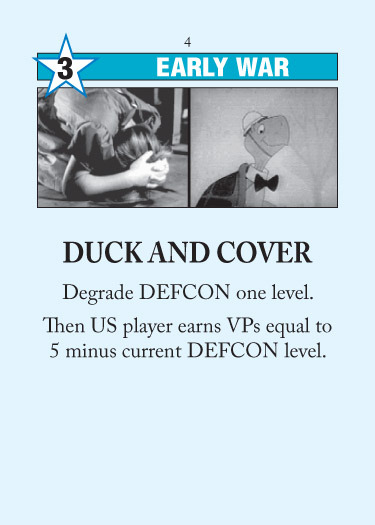
USSR places 2 Influence in Iraq for Control!
USSR places 1 Influence in Italy!
US gains 2 Victory Points!
DEFCON drops to 3!
Game Status
Current Phase: Turn 1, US Action Round 4
Victory Points: US 2
DEFCON Level: 3
US cards in hand: 4 + The China Card (face down)
USSR cards in hand: 2
Cards remaining in draw deck: 22
Cards in discard pile: Five Year Plan, The Cambridge Five, Red Scare/Purge, Nuclear Test Ban, US/Japan Mutual Defense Pact, NORAD, UN Intervention, Arab-Israeli War, Duck and Cover
Cards out of play: De-Stalinization
Ongoing Effects
None

It is now the US's Action Round. Please email me the card for the round, as well as how you would like the card to be played and (if the card contains an opponent's Event) if you would like the Event to occur before or after your action. This decision is due by 7PM PST (-8 GMT) on Wednesday, November 5th.
Throughout the next few weeks those suspected of being Soviet agents in the former socialist state of Iran were executed in a swift military coup. The Soviet focus on the Middle East and Syria's aggression against Israel would surely bring the region into chaos, and the people needed stability. Persia had no quarrel with Israel, it was purely an Arab conflict, but despite Ben Gurion's many requests they refused to ally themselves with the Jewish nation. The mullahs would surely stir up trouble if the military leadership in the Provisional Revolutionary Council tried anything like that. For now, a non-aggression pact would do.
Across the world another nation rose up. Revolutionaries Fidel Castro, Raul Castro, and Che Guevara had been leading a guerrilla war in Cuba for 6 years, and had finally toppled Batista, despite the Communists refusing to aid them. The new government had many problems, with heads of state being backed by the US and seeking to renege on the rebel's program of land reform for the peasants. Fidel eventually seized power to undertake the effort himself. While initially seeking aid from the US, he was quickly rebuffed, as the fields he was seizing for the workers happened to be largely owned by US sugar companies. They turned instead to the USSR, and gained an ally for years to come.

USSR plays Fidel for Ops!

The US attempts a Coup in Iran and rolls a 5!
The USSR loses 3 Influence in Iran!
DEFCON degrades to level 2!
The USSR gains 2 Military Operations!
USSR places 3 Influence in Cuba for Control!
Game Status
Current Phase: Turn 1, USSR Action Round 5
Victory Points: US 2
DEFCON Level: 2
US cards in hand: 3 + The China Card (face down)
USSR cards in hand: 2
Cards remaining in draw deck: 22
Cards in discard pile: Five Year Plan, The Cambridge Five, Red Scare/Purge, Nuclear Test Ban, US/Japan Mutual Defense Pact, NORAD, UN Intervention, Arab-Israeli War, Duck and Cover
Cards out of play: De-Stalinization, Fidel
Ongoing Effects
None

It is now the USSR's Action Round. Please email me the card for the round, as well as how you would like the card to be played and (if the card contains an opponent's Event) if you would like the Event to occur before or after your action. This decision is due by 7PM PST (-8 GMT) on Thursday, November 6th.
President Leocrusher stepped up to the mic. "The United States has received from the Finnish Government an urgent appeal for financial and economic assistance. Preliminary reports from the American Economic Mission and reports from the American Ambassador corroborate the statement of the Government that assistance is imperative if Finland is to survive as a free nation. I do not believe that the American people and the Congress wish to turn a deaf ear to the appeal of the Greek Government.
Finland is not a rich country. Lack of sufficient natural resources has always forced them to work hard to make both ends meet. Since 1939, this industrious and peace loving country has suffered invasion, years of cruel enemy occupation, and bitter internal strife. After the war American diplomats found that the retreating Soviets had destroyed virtually all the railways, roads, port facilities, communications, and merchant marine. More than a thousand villages had been burned. Eighty-five per cent of the children were tubercular. Livestock, poultry, and draft animals had almost disappeared. Inflation had wiped out practically all savings. As a result of these tragic conditions, a militant minority, exploiting human want and misery, was able to create political chaos which, until now, has made economic recovery impossible.
The peoples of a number of countries of the world have recently had totalitarian regimes forced upon them against their will. The Government of the United States has made frequent protests against coercion and intimidation in Poland, Italy, and Iran. I must also state that in a number of other countries there have been similar developments.
At the present moment in world history nearly every nation must choose between alternative ways of life. The choice is too often not a free one. One way of life is based upon the will of the majority, and is distinguished by free institutions, representative government, free elections, guarantees of individual liberty, freedom of speech and religion, and freedom from political oppression. The second way of life is based upon the will of a minority forcibly imposed upon the majority. It relies upon terror and oppression, a controlled press and radio; fixed elections, and the suppression of personal freedoms.
I believe that it must be the policy of the United States to support free peoples who are resisting attempted subjugation by armed minorities or by outside pressures. I believe that we must assist free peoples to work out their own destinies in their own way. I believe that our help should be primarily through economic and financial aid which is essential to economic stability and orderly political processes.
The free peoples of the world look to us for support in maintaining their freedoms.
If we falter in our leadership, we may endanger the peace of the world -- and we shall surely endanger the welfare of our own nation.
Great responsibilities have been placed upon us by the swift movement of events.
I am confident that the Congress will face these responsibilities squarely."

USSR plays Truman Doctrine for Ops!

US Event Removes Influence in Finland!
USSR Adds 1 Influence in Iran!
Game Status
Current Phase: Turn 1, US Action Round 5
Victory Points: US 2
DEFCON Level: 2
US cards in hand: 3 + The China Card (face down)
USSR cards in hand: 1
Cards remaining in draw deck: 22
Cards in discard pile: Five Year Plan, The Cambridge Five, Red Scare/Purge, Nuclear Test Ban, US/Japan Mutual Defense Pact, NORAD, UN Intervention, Arab-Israeli War, Duck and Cover
Cards out of play: De-Stalinization, Fidel, Truman Doctrine
Ongoing Effects
None

It is now the US's Action Round. Please email me the card for the round, as well as how you would like the card to be played and (if the card contains an opponent's Event) if you would like the Event to occur before or after your action. This decision is due by 7PM PST (-8 GMT) on Friday, November 7th.

US plays De Gaulle for Ops!
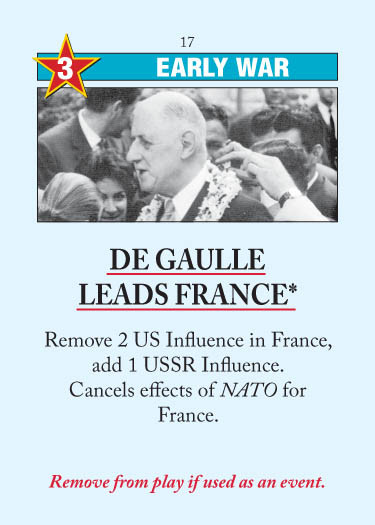
USSR Event adds 1 USSR Influence in France!
USSR Event removes 2 US Influence in France!
US adds 3 Influence in France!
Game Status
Current Phase: Turn 1, USSR Action Round 6
Victory Points: US 2
DEFCON Level: 2
US cards in hand: 2 + The China Card (face down)
USSR cards in hand: 1
Cards remaining in draw deck: 22
Cards in discard pile: Five Year Plan, The Cambridge Five, Red Scare/Purge, Nuclear Test Ban, US/Japan Mutual Defense Pact, NORAD, UN Intervention, Arab-Israeli War, Duck and Cover
Cards out of play: De-Stalinization, Fidel, Truman Doctrine, De Gaulle Leads France
Ongoing Effects
De Gaulle Leads France - NATO canceled for France

It is now the USSR's Action Round. Please email me the card for the round, as well as how you would like the card to be played and (if the card contains an opponent's Event) if you would like the Event to occur before or after your action. This decision is due by 7PM PST (-8 GMT) on Wednesday, November 12th.











